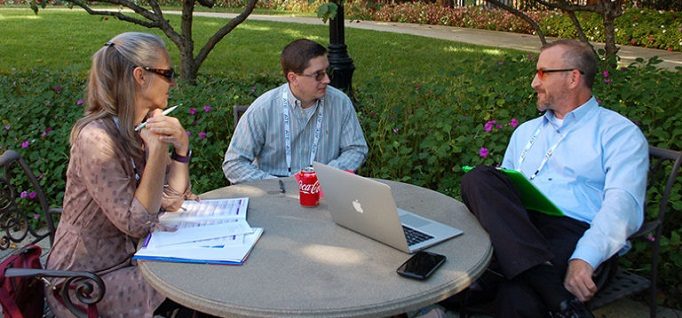New MentorLinks cohort announced
By AACC Staff
September 21, 2021
National initiative brings together community colleges, mentors to advance STEM technician education programs
The American Association of Community Colleges (AACC) announced last week a new cohort for the MentorLinks: Advancing Technological Education program with funding from the National Science Foundation.
The MentorLinks initiative pairs experienced community college mentors with extensive experience in planning and implementing advanced technology programs with colleges seeking support to build, strengthen, and sustain new or existing science, technology, engineering, or mathematics (STEM) technician education programs. Grants to the colleges total $20,000 in seed monies for the two-year grant period plus additional travel support to attend national meetings and events. The program’s primary emphasis is on valuable networking and rich opportunities for technical assistance and professional development that link the cohort with the National Science Foundation’s Advanced Technological Education (ATE) national conference and grant community.
A team of eight community colleges and eight individual mentors were selected through a competitive peer review process and represent innovative projects in advanced manufacturing, engineering technology, chemical technology, information technologies, agricultural technology, and biotechnology. Mentors will work closely with their college teams on activities such as curriculum development or redesign, industry engagement, faculty development, and student recruitment and retention.
The eight selected mentee colleges for the 2021-2023 MentorLinks initiative are Community College of Baltimore County (MD); Itawamba Community College (MS); Nebraska Indian Community College (NE); Prince George’s Community College (MD); South Puget Sound Community College (WA); Tarrant County College (TX); Wake Technical Community College (NC); and Waubonsee Community College (IL).
The eight individual mentors selected to serve the MentorLinks Mentor Team are: David Brown, Principal, Nine Twenty-Four Strategies and Co-Principal Investigator, Project Vision (CA); Vince DiNoto, PI, National GeoTech Center (KY); James Hyder, Lead Adjust Faculty STEM Department and Professional Consultant, Rio Salado College (AZ); Greg Kepner, Educational Consultant and Co-Principal Investigator, MNT-EC Center (IA); Bridgette Kirkpatrick, Professor and Coordinator of Biotechnology, Collin College (TX); Louis Franklin McIntyre, Director, Grants Evaluation and Consulting, McIntrye Leadership Group (NC); Davina Pruitt-Mentle, Lead for Academic Engagement, National Initiative for Cybersecurity Education (MD); and Linda Rehfuss, Professor Emeritus of Biology and Biotechnology, Bucks County Community College (PA).
AACC has managed the small, yet transformational, MentorLinks project since 2002. Assistance to 65 colleges has resulted in the creation of more than 170 new courses, 39 new associate degrees, and 43 new certificates; development of several industry partnerships and internship sites; reported STEM program enrollment increases ranging from 14% to 350%; and the leveraging of more than $10 million in additional grant funding.
The program also is aimed at offering opportunities for smaller and rural colleges that often do not have the resources to apply for grant funding and to build or strengthen their STEM programs. Forty-nine percent of colleges receiving a MentorLinks award are from rural areas.
Positive results
The engineering technology program at Seminole State College (Oklahoma) started in 2018 with guidance and resources from MentorLinks. The program recently had its first graduate.
Jarrod Tollett, associate professor of mathematics, science and engineering, said in a CC Daily article he is grateful for the mentoring that he and Linda Goeller received from Kevin Cooper from October 2017 to 2019. Goeller was a mathematics professor and division chair of science, technology and math when she participated in MentorLinks; she is now vice president for academic affairs.
Tollett identified two things that were critical to the program’s launch: Cooper’s advice to him and Goeller about how to gain insights from local high-tech employers, and Cooper’s explanation to Seminole college administrators about the faculty time and institutional resources needed to start an engineering technology program.
“If I hadn’t gotten the outside help, I don’t think I would necessarily be here today,” Tollett said during a recent interview.
Cooper is dean of advanced technology at Indian River State College (Florida) and principal investigator of the Regional Center for Nuclear Education and Training. Cooper’s experience leading a center funded with grant support from the National Science Foundation’s Advanced Technological Education program is typical of the expertise of MentorLinks mentors.
Learn about the new MentorLinks cohort here.


